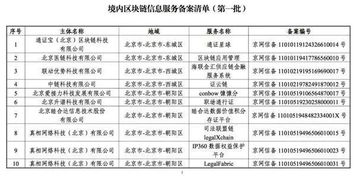Title: Finding the Right Location for Blockchain Data Registration
In the dynamic landscape of blockchain technology, ensuring the security and accessibility of data is paramount. One critical aspect is determining the ideal location for blockchain data registration. Let's explore the factors influencing this decision and suggest guidance for choosing the appropriate jurisdiction for blockchain information registration.
Understanding Blockchain Data Registration
Blockchain data registration involves recording data on a decentralized ledger, providing immutable and transparent records. This process typically occurs through consensus mechanisms across a network of nodes, ensuring data integrity and security.
Factors Influencing Location Choice
1.
Regulatory Environment
: Different jurisdictions have varying regulations regarding blockchain technology and data registration. Some countries have embraced blockchainfriendly policies, while others impose strict regulations or bans. Assessing the regulatory landscape is crucial for compliance and legal certainty.
2.
Data Privacy Laws
: Data privacy regulations, such as the European Union's General Data Protection Regulation (GDPR), impact blockchain data registration. Jurisdictions with robust data protection laws may offer enhanced privacy measures, aligning with regulatory requirements and user expectations.3.
Tax Implications
: Taxation policies differ across jurisdictions and can significantly impact operational costs for blockchain projects. Evaluating tax incentives, reporting requirements, and compliance obligations is essential for financial planning and sustainability.4.
Infrastructure and Connectivity
: Reliable infrastructure and highspeed internet connectivity are vital for efficient blockchain operations. Access to advanced technology infrastructure supports network performance, scalability, and data accessibility, enhancing overall operational efficiency.5.
Political Stability
: Political stability fosters a conducive environment for blockchain innovation and investment. Jurisdictions with stable governance structures and minimal political risks offer greater certainty for longterm business operations and regulatory compliance.6.
Legal Framework
: Clear and enforceable legal frameworks facilitate contractual agreements, dispute resolution, and intellectual property protection within the blockchain ecosystem. Assessing the legal framework ensures legal clarity and risk mitigation for stakeholders.7.
Blockchain Adoption and Support
: Jurisdictions actively promoting blockchain adoption through supportive policies, research initiatives, and industry collaborations provide a favorable environment for innovation and growth. Engaging with blockchain communities and assessing local support networks is beneficial.Guidance for Choosing the Right Location
1.
Research and Due Diligence
: Conduct comprehensive research on potential jurisdictions, considering regulatory frameworks, legal requirements, and market conditions. Evaluate the alignment of jurisdictional policies with your project's objectives and values.2.
Consult Legal Experts
: Seek guidance from legal experts specializing in blockchain law and international regulations. Legal counsel can provide insights into compliance obligations, risk assessment, and contractual agreements, facilitating informed decisionmaking.3.
Assess Risk and Compliance
: Evaluate the risks associated with regulatory uncertainty, geopolitical factors, and compliance obligations in each jurisdiction. Mitigate risks through proactive measures, such as regulatory compliance strategies and contingency planning.4.
Consider Future Expansion
: Anticipate future growth and expansion opportunities when selecting a jurisdiction for blockchain data registration. Evaluate scalability options, crossborder considerations, and regulatory implications to accommodate future business needs.5.
Engage with Local Communities
: Engage with local blockchain communities, industry associations, and government agencies to gain insights into the local ecosystem and regulatory landscape. Building strategic partnerships and networking enhances market awareness and facilitates collaboration opportunities.6.
Seek Clarity on Legal Jurisdiction
: Clarify legal jurisdictional issues, including jurisdictional disputes and conflict resolution mechanisms, to ensure legal certainty and mitigate legal risks. Establishing clear contractual agreements and dispute resolution mechanisms is essential for business continuity.7.
Regular Compliance Monitoring
: Stay abreast of regulatory developments and compliance requirements in the chosen jurisdiction. Implement robust compliance monitoring mechanisms and adapt to evolving regulatory changes to maintain regulatory compliance and mitigate legal risks.Conclusion
Selecting the right location for blockchain data registration requires careful consideration of regulatory, legal, economic, and technological factors. By conducting thorough research, engaging with legal experts, and assessing risk and compliance obligations, blockchain stakeholders can navigate the complex landscape of jurisdictional considerations and establish a secure and compliant framework for data registration.
This comprehensive guide offers insights into the multifaceted considerations involved in selecting the ideal location for blockchain data registration. Whether navigating regulatory complexities or evaluating infrastructure readiness, informed decisionmaking is essential for ensuring the security, compliance, and scalability of blockchain operations.
标签: 区块链备案是什么意思 区块链 备案 区块链信息服务备案查询 区块链信息服务备案清单(第二批) 区块链信息备案地点在哪查询







